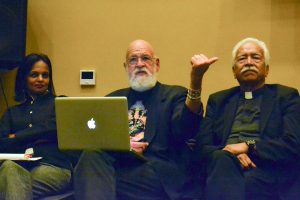Panelists connect religion to nature in discussion
The USC Environmental Student Assembly hosted an event last night called “Sacred Earth,” which analyzed ways in which religion and environment are intertwined and how religion can help solve climate change.

Lena Altaffer | Daily Trojan
Environmental importance · Jeremy Kagan, a professor at the USC School of Cinematic Arts, spoke about the sanctity of life in the Jewish faith.
The panel included Victoria Petryshyn, a lecturer in geobiology at USC; Ignacio Castuera, a United Methodist minister; Jeremy Kagan, a professor at the USC School of Cinematic Arts; Asma Mahdi, communications and public relations manager at the UCLA Sustainable LA Grand Challenge; and Mugdha Yeolekar, Postdoctoral Faculty Fellow in Theological Studies at Loyola Marymount University. The panel consisted of experts on climate change and the Catholic, Jewish, Muslim and Hindu faiths. Those who represented their faiths gave tangible examples of how their religion has advocated for the protection of the environment.
According to Yeolekar, for those who follow Hinduism, all natural things are sacred and there is a connection between nature and a higher power. Yeolekar quoted a passage from a Hindu religious text, in saying that “one tree is equal to 10 suns,” illustrating the value placed on life and the importance of non-violence toward all living creatures. This value stems from the fact that the environment and humans share the same space on Earth.
“We are sharing the environment in a participatory model of religion,” Yeolekar said.
There are many historical examples in which the value of the Earth has prompted Hindus to act for the good of the environment, Yeolekar said.
In Hindu culture, whenever food is received, it is a gift from a higher power that should be repaid, often by planting saplings. For example, in the 1980s, Hindus started a movement to hug trees to prevent them from being cut down, calling them their “children.”
The Torah, the central text in Judaism, advocates for much of the same divine relationship between humans and their environment as in Hinduism. Kagan said that in Judaism all things are held sacred, and thus everything on the Earth should be protected by humans.
“If you do harm to the Earth, you are doing harm to the God that created you and Earth,” Kagan said. “Everything here, including your life, is alone from God and you are responsible to be a shepherd.”
Even though the Torah advocates respecting the environment and participating in rituals that close the gap between humans and nature, Kagan said the majority of Jews do not practice those principles.
Castuera, who represented the Catholic faith, admitted that Catholic leaders and institutions have historically been the biggest culprits of environmental degradation and the exploitation of indigenous people.
“We had the false sense that the Earth was going to be there forever and we can exploit it,” Castuera said. “Historically, Christianity has been the creator of the image that we can keep on exploiting this earth.”
Even with the negative images associated with Catholic institutions, Castuera believes that there is progress to be made, and that the current dialogue by Pope Francis and similar religious leaders are helping to set the church back in the right direction.
“The element of tenderness is vital and it’s essential,” Castuera said. “The present Pope picks up also that element of tenderness.”
Mahdi says that there are 750 verses in the Quran that reference nature. In most cases, it tells readers that it is our shared responsibility to return the environment to its purest possible form.
But for Mahdi, the power of Muslims to effect change comes primarily in their numbers, and not the scripture. There are 1.6 billion Muslims in the world, which Mahdi is an important start. She believes that unity can help bring together comprehensive climate reform.
“We transcend every race, language and country,” Mahdi said.
That climate reform is important, as Petryshyn argued, while showing scientific evidence pointing to the dangers of climate change. She said rising carbon dioxide levels and resultant temperature increase is a cause for worry, but agreements like the 2015 Paris Climate Conference put humanity on the right track.
